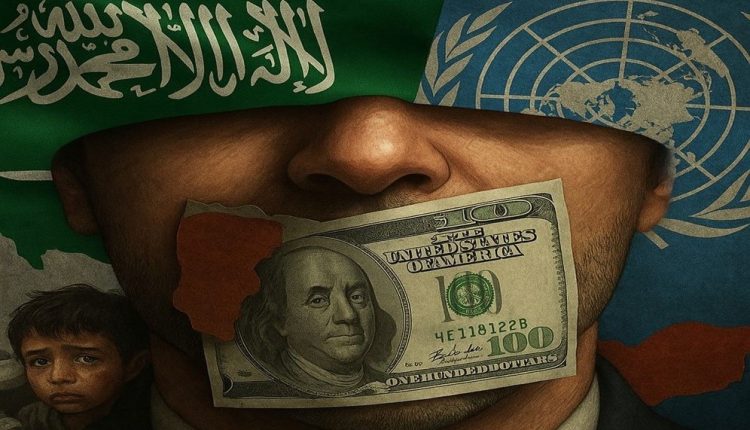Paid Silence: How Saudi Arabia Bought the World’s Silence Over Its Violations in Yemen
Investigative Report – By: Abdulrahman Al‑Abed
Overwhelming Evidence… Then a Suspicious Muzzle
On 8 September 2021, the United Nations Human Rights Council’s Group of Eminent Experts issued its fourth report on Yemen, documenting a series of grave violations against civilians, including:
Indiscriminate airstrikes
Restrictions on humanitarian access
Torture and sexual violence in detention centers
Enforced disappearances and unfair trials
The team’s chair, Kamel Jendoubi, warned that a culture of fear in Yemen was intensifying and that impunity had become the rule rather than the exception. The report explicitly called for referring the situation in Yemen to the International Criminal Court and requested a one‑year renewal of the experts’ mandate.
Saudi Pressure… And the Passage of a “Silence Deal”
On 7 October 2021, the Human Rights Council voted against renewing the experts’ mandate. Twenty‑one countries rejected the extension, eighteen supported it, and seven abstained.
Amnesty International and Human Rights Watch publicly accused Saudi Arabia of leading a lobbying campaign to block the vote, calling the outcome a “stain on the conscience of the international community.” The Guardian later revealed that Saudi Arabia had directly pressured states such as Indonesia—threatening to obstruct pilgrims’ access for Hajj—and Togo, using diplomatic and financial incentives to secure their votes.
Fabricated “Supporting” NGOs and the Farce of Self‑Investigation
Saudi Arabia did not stop at disbanding the UN team. It went on to circulate a purported joint statement from seventy‑three Yemeni and international NGOs endorsing the end of the experts’ mandate—never revealing the signatories or publishing the statement.
Simultaneously, Riyadh established its own “investigative” panel composed of Saudi officers to probe alleged violations by the Saudi military—a move human rights bodies derided as “absurd” and “mocking” accountability.
Secret Prisons… And a Shocking U.S. Involvement
No account of Yemen’s abuses is complete without noting international press investigations—most prominently by The Intercept—which exposed U.S. forces’ participation in enforced disappearances and torture within secret prisons in southern Yemen run by the UAE.
Yemeni rights lawyer Huda al‑Sarari and her team compiled a database of over 10,000 detainees, many subjected to torture—including sexual assaults with metal rods—and documented direct American involvement in some cases. Reports from Human Rights Watch and the Associated Press corroborated these findings, while Washington and Abu Dhabi remained silent.
Burying the Truth with Money and Influence
Saudi Arabia was not alone in silencing scrutiny. Allies in the Saudi‑led Arab coalition—such as Bahrain and the UAE—assisted, and major powers opted for silence rather than risk Riyadh’s ire.
The international NGO CounterCurrents warned that ending the UN experts’ mandate amounted to an explicit license for the perpetrators of war crimes to continue unaccounted, in the absence of any independent oversight.
Conclusion
What transpired in Geneva was far more than a procedural vote on a mandate renewal—it marked a watershed in international justice for Yemen. It exposed how institutions can be bought, truth can be toppled, and victims can be buried beneath diplomatic sand and the corridors of political finance. While Yemenis were left to die in silence, the Human Rights Council bowed to the power of money… and fell silent itself. This investigation seeks to document what must never be forgotten.

